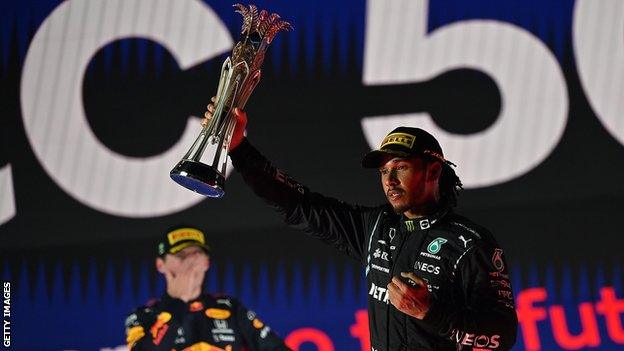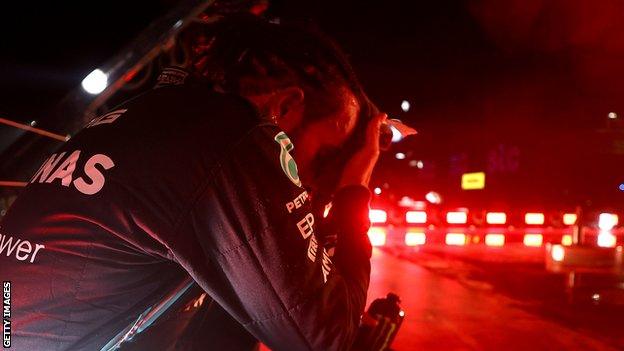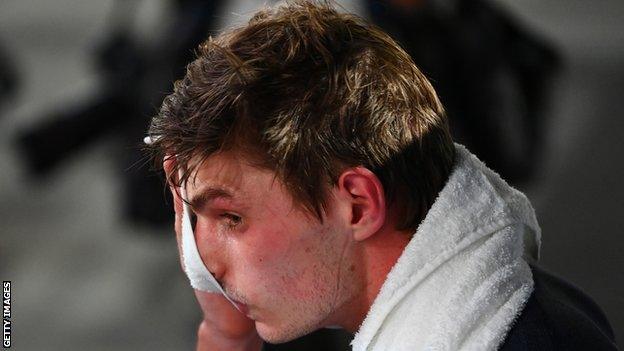Lewis Hamilton v Max Verstappen: 'It could well end in a messy situation'
- Published
- comments

The Abu Dhabi Grand Prix is live on 5 Live and the BBC Sport website
Lewis Hamilton and Max Verstappen head into a winner-takes-all championship decider in Abu Dhabi this Sunday with different views of what is fair and acceptable driving.
Once the dust has settled and the debris has been picked through, that's the fundamental conclusion from the craziest and most dramatic race yet in a Formula 1 season that has been packed full of them.
The Saudi Arabian Grand Prix will go down in history as one of the most remarkable races F1 has ever seen. And it has set Verstappen and Hamilton up for one of the sport's most dramatic climaxes, both needing to work out how to deal with the other on track.
In a race packed full of controversy and incident, Verstappen and Hamilton had no less than four flash points between them, including a collision.
The Red Bull driver was found guilty in two separate incidents and handed penalties for dangerous and/or unfair driving, totalling 15 seconds of race time in all.
Hamilton called his rival a "crazy guy" over the radio during the race - adding in a swear word for good measure - and did not take it back afterwards, even if he did admit that the comments were made in the heat of the moment and he would "maybe feel differently" once he'd watched the race back.
Verstappen, for his part, repeated his belief that he was driving within acceptable limits, but refused to be drawn too much on the various controversies.
"We don't need to make headlines out of it," he said. "They don't deserve that."
Headlines, though, there most certainly will be, whatever anyone thinks of the rights and wrongs of the various incidents.

It was one of Hamilton's hardest on-track fights
What were the controversial moments?
In a nutshell, the key moments of the race were as follows:
At the first restart after a red-flag period, Verstappen went around the outside of Hamilton's Mercedes at the first corner and then took the lead by cutting inside the kerb on the second. It gave Verstappen the lead, and dropped Hamilton, who had been forced wide, behind Alpine's Esteban Ocon.
But the move was judged to be against the rules because Verstappen had passed Hamilton by going off the circuit. As it happened, the race was stopped immediately for a separate incident, and there followed the extraordinary sight of Red Bull negotiating with race director Michael Masi as to where Verstappen should line up for the restart.
They agreed on him starting third, behind Ocon and Hamilton. Into the first corner, Verstappen then dived for the inside, and quite brilliantly and legitimately passed both into the first corner to take the lead.
Hamilton quickly dispatched Ocon, and another intense race between the title contenders began to unfold.
Hamilton was clearly quicker, a smarter tyre choice and better race set-up inverting the performance tables from qualifying, when Verstappen had been on course for pole before crashing at the final corner.
Starting lap 37, Hamilton got a run on the Red Bull heading down to Turn One and was marginally ahead on the outside as they turned into the corner.
In a situation with remarkable similarities to the controversy in Brazil two races ago, Verstappen went in deep and ran off the track, Hamilton avoided him and went off, too, and Verstappen retained the lead.
Unlike in Brazil, where the incident was not investigated, this time Red Bull were told Verstappen had to give the place back. The team instructed him to do so. But the message did not get through to Mercedes until the two cars were heading towards the final corner and they had no time to tell Hamilton.
Verstappen slowed to let Hamilton by. Hamilton did not understand what was going on and slowed down behind him until Verstappen hit the brakes hard and Hamilton tried to take avoiding action, clipping his front wing against the Red Bull's rear tyre.
They then raced on for six further laps, during which Verstappen was handed a five-second penalty for the Turn One incident. He tried initially to see if he could pull that margin and more on Hamilton to secure the win, but found he could not, and so slowed to let Hamilton by again, only to immediately pass him back.
A lap later, Hamilton finally got by into the last corner, pushing Verstappen wide and to the limit of the track as he did so, a move that earned Mercedes a warning that Hamilton was close to being given a black-and-white flag for dangerous driving.
Digging into the incidents
Let's look at the Turn One incident first:
The background to it is that many of the drivers had not understood why Verstappen had not been investigated in Brazil. They felt what he had done should not have been permitted.
The Brazil incident was discussed extensively at the drivers' briefing at the following race in Qatar, the drivers seeking clarity as to what was and was not allowed in terms of fair racing.
The drivers were told that, while all incidents would be judged on their individual merits, if it was felt a driver had pushed someone off track or forced them to avoid a collision, he would be penalised, as the rules dictate.
Verstappen said: "He had a run [on me] a bit like Brazil and of course I braked late and got a little bit off line and had a moment and went wide. But he also didn't make the corner, so we both basically missed the corner and then I don't think it's fair to say I got the penalty.
"I find it interesting I am the one who gets penalised when both of us ran outside the white lines. In Brazil it was fine and now suddenly I get a penalty for it.
"You could clearly see we both didn't make the corner. But I don't want to spend too much time on it. We both have to move forward. We are talking more about white lines and penalties than proper F1 racing and that's a little bit of a shame."
Hamilton said: "We have seen multiple incidents like Brazil where we're supposed to do our racing on track between the white lines and the rules haven't been clear from the stewards and those things have been allowed.
"I know I can't overtake someone and go off track and keep the position. That's well known between all us drivers. But it doesn't apply to one of us, I guess."
Did he think Verstappen had driven dangerously?
"I definitely feel there were scenarios where that was the case," Hamilton said. "This is not the first time I've had to avoid a collision, and that's how it goes at the moment."
Red Bull team principal Christian Horner said he felt the penalty was "harsh", adding: "Is he [Verstappen] solely to blame if two drivers run off track?"
The answer to that from the stewards in Jeddah is, effectively, yes he is. Verstappen was the one on the inside, with Hamilton alongside on the outside. Verstappen went in too deep and ran wide, whether deliberately or because he lost control, so it's his fault, they ruled.
And that's because in that scenario the driver on the outside has a choice to either give way or crash. It was exactly this sort of approach from Ayrton Senna and Michael Schumacher that led to these rules being imposed, when they chose to ignore what until then had been a gentlemen's agreement between drivers.
Red Bull, meanwhile, pleaded inconsistency on behalf of the stewards.
Horner said: "I would ask you to look at Lewis' incident in the final corner where he pushed Max off in the same way.
"Any driver who has come through karting or has raced in any category, that is hard racing. It is how these kids have raced through their careers.
"Lewis gives what he gets and he's very wily with how he does it. These are two guys who are fighting over such fine margins pushing to the boundary. If you don't want them to run wide, put a gravel trap there."

Verstappen has always raced innovatively, and pushed the interpretations of the rules
Why was Verstappen penalised again?
Now for the collision on the run to the last corner.
Verstappen said: "I went to drive to the right side and I slowed down and I was braking and downshifting and he just stayed super-close behind me and I don't really understand why. I was just trying to let him by.
"I'm just going slower and slower, pulling the downshift. We had a… oh I don't know, a miscommunication or whatever and he ran into the back of me and that was it."
Hamilton was asked why he had not just gone past Verstappen if he saw him slowing in front of him.
"One, it wasn't clear," he said. "Two, I didn't get the information [that he had to let me by]. Then it became apparent he was trying to let me past, which was what he had been asked to do, but before the DRS zone.
"That would mean he would just DRS back past me. That was the tactic. The worst part was the heavy braking that happened at one point. That's when we collided. That was the dangerous part."
Hamilton is referring to the fact that they were approaching what's known as the DRS detection point - where if a driver is within one second of the car in front, he can use the overtaking aid to boost his speed down the following straight. Hamilton was trying to avoid a scenario where Verstappen let him by, only to pass him back with DRS down to Turn One.
The stewards looked into this incident after the race. They gave Verstappen a 10-second time penalty and two penalty points on his licence.
Their reasoning was that Verstappen had been told to give the place back "strategically" and "it was obvious that neither driver wanted to take the lead prior to the DRS detection line".
They added: "The key point was that [Verstappen] then braked suddenly [at 69 bar] and significantly, resulting in 2.4g deceleration… The sudden braking was determined to be erratic and hence the predominant cause of the collision."
If you are viewing this page on the BBC News app please click here to vote., external
What does this mean for Abu Dhabi?
The background to all this is that Hamilton went into the race knowing that Verstappen could afford a collision between the two of them and he could not.
If neither finished, the gap between them going to Abu Dhabi would have remained at eight points. That's the most Hamilton could make up on Verstappen in one race if he wins and the Dutchman is second.
But that would not be enough for Hamilton to win the title, because although they would be level on points in that scenario, Verstappen would be champion on the basis of having one more win.
That's absolutely not to say Verstappen tried to take Hamilton out on Sunday. He drove like he always does. Hamilton knows that will be how Verstappen drives, but he also knew that he had to win, and a non-finish would be the end of his title hopes. So he had to be the one to give way in any on-the-edge wheel-to-wheel scenario.
In a way, although they are now tied on points, that position has not changed much.
All things being equal, they will race for the win again at Yas Marina on Sunday. But Verstappen has nine wins to Hamilton's eight. So if neither finish, Verstappen will be champion.
Do Red Bull care how they win it, Horner was asked?
"Yes of course we do," he said. "We want to win it on the track, not in the stewards' room, not in a gravel trap. It has been a tough fight, all the way through the year. There has been some fantastic racing. I hope it is a fair and clean race in Abu Dhabi."
Mercedes F1 boss Toto Wolff said: "In Brazil, I said we are setting a precedent if it's not investigated that could end up really ugly for the championship. And we have seen incidents that were pretty much Brazil at slower speeds. And we don't want to have that in Abu Dhabi. The quicker car with the quicker driver should win the championship and not by taking each other off.
"I would hope today's race has enough repercussions that everybody is going to learn from it and adapt for the final race in Abu Dhabi.
"Similar driving if it were deemed by the stewards to be over the line would probably also be penalised in Abu Dhabi and that could well end in a messy situation for everybody and I don't think the championship deserves a result influenced by a collision. So I very much trust in the self-regulating decision."

The baseball coach vs an algorithm: Can formulas really pick a better team then their coach?
What makes a great captain? Terry Butcher looks at the qualities managers look for in a leader

